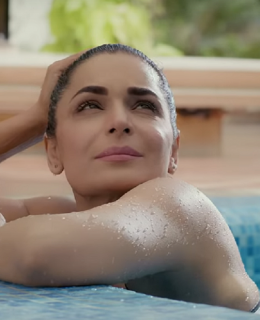Pakistani Dramas are notorious for featuring submissive women in dystopian houses, which aim to create their notion of a perfect woman. These characters are abused, downtrodden and intentionally made dependent. More importantly, these shows have the audacity to judge them by a certain criteria and categorize them accordingly. The ensuing slut shaming and confining codes of conduct strip them of individuality, choice and stability. Thereby, these shows normalize such compartmentalization and oppression of the other (female) by the self (society).
In an inverted frame, Aunt Polly from ‘Peaky Blinders’, a postwar show about an actual gang, fills the gap of self empowered women in her patriarchal society. Although it’s a western milieu, the male dominant context features the masculine as the universal (hunter) and the feminine as the exception (hunted). Polly’s nephews, Tommy and Arthur Shelby, are supposed to be the clan’s leaders according to the society’s patriarchal standards. However, Polly not only has direct involvement in important family decisions but keeps the rampant violence and machismo in check.
Here’s a list of characteristics that this tower of strength espouses and can be transferred to our female characters for strong exemplification:
- She is pro-choice. Pol believes that women have the right to choose their own path in life in all cases including choice of partners and bearing children. When Ada’s boyfriend impregnated her, Pol was her only source of support. In this situation of convoluted moral imperatives, Ada risked her whole life in exchange for the titles of ‘whore’ and ‘bastard’ for herself and the child, respectively. Not only did Aunt Pol support her in aborting the pregnancy, she also nullified the societal standards that shunned Ada’s whole being.

- Accordingly, she does not judge her own or other women’s worth in relation to their bodies. She does not define women in relation to their relationship status or dress choices. It is significant to mention that her partner left her after impregnating her as a teenager. While the society was to imprint her with an easy ‘A’, she didn’t let the incident define her. Sadly, she had to perform her own painful abortion, but it only proves the magnitude of her physical and mental strength.


- She defies gender roles and aspires for financial independence. In fact, when the males of the family were away at the First World War, she singly managed the entire family business. Although it’s not shown on-screen, it is implied that the feminist icon had to work out probabilities, manage accounts and deal with bloodthirsty gangsters.

- It is wrongfully assumed that women are physically weaker than men and Aunt Pol disproves this time and again. She knows how to defend herself tactfully and forcefully. Indeed, her fearlessness does not exclude the use of guns when required. However, she does not embody the mindless violence that the men around her constantly perform. Being a sensible individual, she believes in avoiding conflict while disregarding egoes.
 Showing magnificent emotional strength, she neither dwells in the miseries of the past, nor lets misfortunes define her. She shuns the social gaze and doesn’t let cruelties paralyse her. The loss of her children, taken away by the police on wrongful defamation by a neighbour, sticks with her. However, instead of mulling over the incident and hope for a saviour, she futilely tries to find them herself. More importantly, she aims to help other women, including Ada, in becoming strong, resourceful mothers.It is important to have strong and nuanced female characters on-screen, because such examples can transform one’s outlook towards one’s own life. Self-reliant feminine representations can lead to self-reliant Pakistani women, since they make one aware of their own potential. Instead of serving patriarchal, cookie-cutter standards of femininity, writers should try presenting women fighting their individual battles in diverse contexts to give young girls their superheroes.
Showing magnificent emotional strength, she neither dwells in the miseries of the past, nor lets misfortunes define her. She shuns the social gaze and doesn’t let cruelties paralyse her. The loss of her children, taken away by the police on wrongful defamation by a neighbour, sticks with her. However, instead of mulling over the incident and hope for a saviour, she futilely tries to find them herself. More importantly, she aims to help other women, including Ada, in becoming strong, resourceful mothers.It is important to have strong and nuanced female characters on-screen, because such examples can transform one’s outlook towards one’s own life. Self-reliant feminine representations can lead to self-reliant Pakistani women, since they make one aware of their own potential. Instead of serving patriarchal, cookie-cutter standards of femininity, writers should try presenting women fighting their individual battles in diverse contexts to give young girls their superheroes. - P.S. Aunt Pol is my ideological superhero.
Nimra Ishfaq
Life’s a Catch-22


